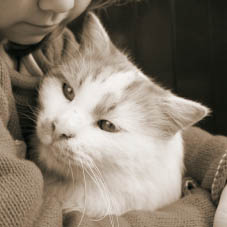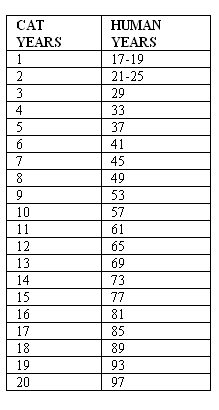What’s Your Cat’s Real Age?

Everyone wants the question answered: “How old is my cat?” The old, outdated idea was that one human year is equivalent to seven cat years. More accurately, the first two years of a cat’s life are roughly equivalent to the first 25 years of human life; thereafter, each calendar year is roughly equivalent to four feline years.
Aside from this formula, there are other caveats that play a role in determining your cat’s age; such as environment, diet, and mental health. To determine your cat’s real age, look at the conversion chart pictured below to determine your cat’s human age. Then, subtract years from your cat’s human age, when applicable, after answering the following questions:

Do you keep your cat safe and secure inside your home at all times? If so, subtract 7 years from your cat’s human age.
Keeping your cat indoors reduces his or her risk of attack by other cats, dogs, coyotes, and other predators, as well as reduces the risk of being hit by a car-one of the most common outdoor threats. Your cat will also be less likely to contract disease or parasites and less likely to require emergency treatment.
Is your cat spayed or neutered? If so, subtract 5 years from your cat’s human age.
Having your female cat spayed helps minimize the risk of mammary cancer and having your male cat neutered protects him from testicular cancer and prostate problems.
Does your cat visit the veterinarian at least once a year? If so, subtract 4 yrs from your cat’s human age.
Annual examinations allow your vet the opportunity to evaluate your cat’s health and detect feline health problems before they turn into serious cat diseases or illnesses.
Do you make sure that meat is the first ingredient in your cat’s food? If so, subtract 4 years from your cat’s human age.
The ingredient that is listed first makes up the biggest part of the food, so seek out cat food where a named meat (chicken, turkey, beef, etc) is the first ingredient and avoid unnamed foods (poultry by-products, wheat gluten, etc.). Always follow your veterinarian’s instructions for feeding a sick or senior cat requiring special prescription cat food.
Does your cat have a proportional figure, with slightly padded ribs and a distinct waist? If so, subtract 2 years from your cat’s human age.
Overweight cats are more susceptible to certain health conditions. Excess weight increases a cat’s risk of health complications that can affect the respiratory, cardiovascular, and skeletal systems. One easy way to combat overweight cats is to cut back on the treats. Kitty treats should compromise no more than 10% of your cat’s total daily diet. Talk to your veterinarian for more information if you think your cat is overweight.
Do you have a variety of feline-friendly toys and encourage your cat to play for at least 15 minutes per day? If so, subtract 2 years from your cat’s human age.
Playing with your cat is the simplest way to maintain your cat’s overall health. Playtime helps increase metabolism, minimize weight gain, and boost circulation.
Is your home free from toxins such as cigarette smoke, poisonous plants, rat poison, phenol and ammonia household cleaners? If so, subtract 2 years from your cat’s human age.
Research shows that the chances of developing smoking-related cancers, as well as lung infections, respiratory problems, asthma and other feline health problems are greater for cats living in smoking environments. And keeping your household free from poisonous plants and other types of toxins helps keep your cat safe.
Do you brush your cat’s teeth and/or regularly give dental treats? If so, subtract 1 year from your cat’s human age.
Periodontal disease, caused by plaque buildup, can ultimately affect various organs of the body and the nervous system if left untreated. Cats over the age of five years old become more susceptible to dental diseases, so it is important to keep your pet’s teeth and gums clean with regular home dental care. If brushing your cat’s teeth seems too daunting, try giving dental treats. C.E.T. Home Dental Care makes a line of cat dental treats that can be purchased online.
Please be aware that this real age test is only a guideline and there are other determinants such as genetics that may factor into your cat’s age. As always, talk to your veterinarian for more information on how to help your cat live a long and healthy life!
And be sure to read next week’s column to find out your dog’s real age!



